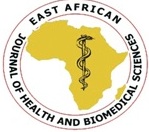Knowledge of Women about Tuberculosis and the Role of Health Extension Workers among Households in East Hararghe Zone, Ethiopia
Abstract
Background: Tuberculosis (TB) is still one of the major public health problems in Ethiopia. This is mainly due to lack of knowledge about its cause, mode of transmission, symptom, and appropriate treatment, which in turn affect the health seeking behavior. Little is known about the women’s knowledge of TB and Health Extension Workers (HEWs) contribution on information dissemination about TB.
Objective: To assess knowledge of women about tuberculosis and the role of Health Extension Workers among
households in East Hararghe Zone, Eastern Ethiopia.
Methods: A community based cross-sectional quantitative study was conducted from February to March, 2014 on 2,319 households selected by multistage stratified sampling technique from six districts in East Hararghe Zone. Twelve trained data collectors collected the data from household women using a structured uestionnaire. Data were analyzed using descriptive statistics and predictors were identified with logistic regression.
Results: One thousand six hundred eighty seven (86%) study participants were interviewed to assess the comprehensive knowledge of TB. Frequent visits to disseminate health information about TB made by Health Extension Workers were significantly higher among rural study participants (94.4%) than urban study participants (76.6%). Being age > 45 years (AOR=2.08; 95%CI: 1.37, 3.16), divorced marital status (AOR= 3.49; 95%CI: 1.37, 8.91), 5-8th grade student (AOR=2.72; 95%CI: 1.25, 5.91), 9-10th grade student (AOR= 4.12; 95%CI: 1.19, 14.19) and unemployed (AOR=0.74; 95%CI: 4.64, 16.47) were predictors of comprehensive knowledge of household women. Meanwhile, out of 2319 study participants, 91.8% household women reported that the HEW had visited their house regularly.
Conclusion: Study participants’ comprehensive knowledge about TB was satisfactory. However, significant proportion of the respondents had less knowledge about major symptoms and main routes of transmission. Thus, Health Extension Workers should strengthen targeted health information on TB focusing on the route of transmission and prevention.
Downloads
References
Jira, C., and Bezabih M. 2010. Knowledge, health seeking behavior and perceived stigma towards
tuberculosis among tuberculosis suspects in a rural community in southwest Ethiopia. PLoS One, 5(10):
e13339.
Auer, C., Sarol, J., Tanner, M., and Weiss, M. 2000. Health seeking and perceived causes of tuberculosis
among patients in Manila, Philippines. Tropical medicine & international health, 5(9): 648-656.
Bacay-Domingo, M. C. N. and Ong-Lim, A. L. 2009. A descriptive study of the knowledge, attitudes and
practices on tuberculosis among treatment partners of pediatric patients in Tarlac City. Pediatric Infectious
Disease Society of the Philippines Journal, 10(1): 28-34.
Banteyerga, H. 2011. Ethiopia's health extension program: improving health through community
involvement. MEDICC review, 13(3): 46-49. Cegielski, J. and McMurray D. 2004. The relationship
between malnutrition and tuberculosis: evidence from studies in humans and experimental animals.
The International Journal of Tuberculosis and Lung Disease, 8(3): 286-298.
CSA (Central Statistical Agency) of Ethiopia. 2011. Ethiopia Demographic and Health Survey Addis
Ababa.
Hashim, D., Al Kubaisy, W. and Al Dulayme, A. 2003. Knowledge, attitudes and practices survey among
health care workers and tuberculosis patients in Iraq. East Mediterranean Health Journal, 9(4): 718-731.
Koay, T. 2004. Knowledge and attitudes towards tuberculosis among the people living in Kudat
District, Sabah. Med J Malaysia, 59(4): 502-511.
Legesse, M., Ameni, G., Mamo, G., Medhin, G., Shawel, D., Bjune, G. and Abebe, F. 2010. Knowledge and
perception of pulmonary tuberculosis in pastoral communities in the middle and Lower Awash
Valley of Afar region, Ethiopia. BMC Public Health, 10(1): 1.
Lienhardt, C. 2001. From exposure to disease: the role of environmental factors in susceptibility to and
development of tuberculosis. Epidemiol Rev, 23(2).
Lienhardt, C., Fielding, K., Sillah, J., Bah, B., Gustafson, P., Warndorff, D., Palayew, M., Lisse I., Donkor,
S., and Diallo, S. 2005. Investigation of the risk factors for tuberculosis: a case–control study in
three countries in West Africa. International journal of epidemiology, 34(4): 914-923.
More inside the PDF



